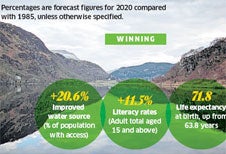Bright tomorrows – but only if we fight crime and learn to get along
Think-tank sees hope for humanity, but it also warns of dire dangers

Your support helps us to tell the story
From reproductive rights to climate change to Big Tech, The Independent is on the ground when the story is developing. Whether it's investigating the financials of Elon Musk's pro-Trump PAC or producing our latest documentary, 'The A Word', which shines a light on the American women fighting for reproductive rights, we know how important it is to parse out the facts from the messaging.
At such a critical moment in US history, we need reporters on the ground. Your donation allows us to keep sending journalists to speak to both sides of the story.
The Independent is trusted by Americans across the entire political spectrum. And unlike many other quality news outlets, we choose not to lock Americans out of our reporting and analysis with paywalls. We believe quality journalism should be available to everyone, paid for by those who can afford it.
Your support makes all the difference.The future of mankind should be bright, with tomorrow's generations set to be healthier, wealthier and better educated, but the planet could become a far more unstable and dangerous place if urgent action isn't taken to fight organised crime, corruption and climate change, that's according to a major new report published tomorrow.
Click HERE to view graphic (139k jpg)
Despite the current famine in East Africa, the 2011 State of the Future report claims access to water, food, healthcare and education are all improving. It claims important improvements are also being made in reducing poverty, extending longevity, cutting conflicts and securing advancement for women in positions of power.
The battles against growing carbon emissions and rising temperatures, unemployment, corruption and terrorism are being lost, it warns. In 2010, 90 per cent of global natural disasters – that killed 295,000 people at an approximate cost of $130bn (£85bn) – were weather-related and fit in with climate-change models.
And although there are fewer wars, down to 10 from 14 the previous year, the number of unstable states grew from 28 to 37 between 2006 and 2011.
"Half the world continues to be vulnerable to social instability and violence," the report says. Inequalities are compounded by the rising costs of food, water and energy which could result in 400 million migrants by 2050.
Demand that outstrips the supply of natural resources along with global organised crime are both cited as major challenges. It says the world is "waking up to the enormity of the threat of transnational organised crime" – which has an estimated income of up to $3trn – but "a global strategy to address this global threat has not been adopted".
"The magnitude of the problem of crime seems to be beyond the control of any agency acting alone because many – if not most – governments are corrupt and have tight links with international crime organisations," says the report by the Millennium Project think tank, formerly part of the World Federation of United Nations Associations. Its State of the Future Index is based on analysis of 28 factors – including education, health, affluence, conflict, freedom and the environment – and on the assessments from 700 experts worldwide. It shows a 10-year period of improvement but warns that there is "no guarantee of a rosy future".
"If current trends in population growth, resource depletion, climate change, terrorism, organised crime, and disease continue and converge over the next 50 to 100 years, it is easy to imagine an unstable world with catastrophic results."
Conversely, if trends of greater organisation, international cooperation and advances in science continue over the same period, "it is easy to imagine a world that works for all".
The internet is credited with helping the Arab Spring and social media is seen as "part of a historic transition from many pockets of civilisations barely aware of each other's existence to a world totally connected". It predicts a new civilisation will emerge from the convergence of minds, information and technology. But the internet presents threats, with states in an "an intellectual arms race to defend themselves from cyber attacks".
The report's authors suggest the world may have to move "from governance by a mosaic of sometimes conflicting national government priorities" to one "increasingly governed by co-ordinated and mutually supporting global policies".
Jerome Glenn, director of the Millennium Project and one of the report's authors, is hopeful. "If we can improve our decision-making as individuals, groups, nations and institutions, then the world could be better than it is today," he said.
Join our commenting forum
Join thought-provoking conversations, follow other Independent readers and see their replies
Comments